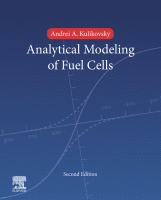Browse content
Table of contents
Actions for selected chapters
- Full text access
- Book chapterAbstract only
Chapter 1 - Fuel cell basics
Pages 1-33 - Book chapterAbstract only
Chapter 2 - Catalyst layer performance
Pages 35-83 - Book chapterAbstract only
Chapter 3 - One-dimensional model of a fuel cell
Pages 85-108 - Book chapterAbstract only
Chapter 4 - Quasi-2D model of a fuel cell
Pages 109-192 - Book chapterAbstract only
Chapter 5 - Modeling of fuel cell stacks
Pages 193-270 - Book chapterAbstract only
Chapter 6 - Applications of analytical models
Pages 271-310 - Book chapterAbstract only
Chapter 7 - Models for PEM fuel cell impedance
Pages 311-344 - Book chapterNo access
Bibliography
Pages 345-354 - Book chapterNo access
Nomenclature
Pages 355-360 - Book chapterNo access
Abbreviations
Page 361 - Book chapterNo access
Index
Pages 363-366
About the book
Description
Analytical Modelling of Fuel Cells, Second Edition, is devoted to the analytical models that help us understand the mechanisms of cell operation. The book contains equations for the rapid evaluation of various aspects of fuel cell performance, including cell potential, rate of electrochemical reactions, rate of transport processes in the cell, and temperature fields in the cell, etc. Furthermore, the book discusses how to develop simple physics-based analytical models. A new chapter is devoted to analytical models of PEM fuel cell impedance, a technique that exhibits explosive growth potential. Finally, the book contains Maple worksheets implementing some of the models discussed.
Analytical Modelling of Fuel Cells, Second Edition, is devoted to the analytical models that help us understand the mechanisms of cell operation. The book contains equations for the rapid evaluation of various aspects of fuel cell performance, including cell potential, rate of electrochemical reactions, rate of transport processes in the cell, and temperature fields in the cell, etc. Furthermore, the book discusses how to develop simple physics-based analytical models. A new chapter is devoted to analytical models of PEM fuel cell impedance, a technique that exhibits explosive growth potential. Finally, the book contains Maple worksheets implementing some of the models discussed.
Key Features
- Includes simple physics-based equations for the fuel cell polarization curve
- Provides analytical solutions for fuel cell impedance
- Includes simple equations for calculation of temperature shapes in fuel cells
- Introduces physical descriptions of the basic transport and kinetic phenomena in fuel cells of various types
- Includes simple physics-based equations for the fuel cell polarization curve
- Provides analytical solutions for fuel cell impedance
- Includes simple equations for calculation of temperature shapes in fuel cells
- Introduces physical descriptions of the basic transport and kinetic phenomena in fuel cells of various types
Details
ISBN
978-0-444-64222-6
Language
English
Published
2019
Copyright
Copyright © 2019 Elsevier B.V. All rights reserved.
Imprint
Elsevier
